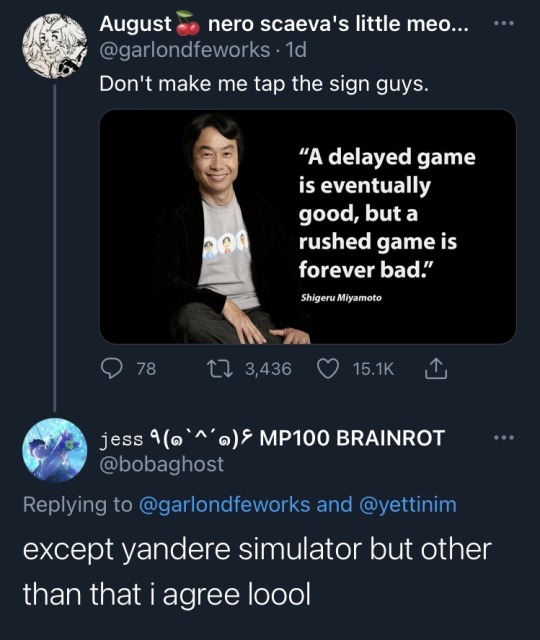#yan sim drama
Text
My opinion on the latest Yandere Dev Drama [TW: Grooming].
It was always implied Yandere Dev, real name Alex Mahan, to be that type of individual: in both Yandere Simulator and other games he worked in the past there were type of content around the "sexualizing teens and unconsensual women" in general. What happened is beyond disgusting, but unfortunately I'm not surprised, I'm surprised this didn't happened sooner.
I never get people's interest in the game *after* some of the initial drama started spreading back in the first days, as well as his open disinterest in actually finishing the game, it always felt like he genuinely doesn't care as long he makes money. I understand the moment you work on a project and that starts to be popular you want to think in the monetizable part, heck I would do the same, but I still would try to make a product people would enjoy consuming as well as me working on it.
Outside of that he would openly exploit his fans, even teens, to work for him without paying them, disrespecting someone for having DID, and make very f-ed comments on how he wants to m-rder his parents.
We can all agree from that people should have started worrying.
I originally liked the concept of the game, but I started loosing interest after these dramas I just write started spreading and his reactions in people making fan-games of it: saying "people were stealing his idea", like I'm sure he created the anime archetype of Yandere 100%. Kind of ironic how a lot of fangames team ended up in some sort of drama as well.
All of this always stopped me to make any kind of fanart of the game, spin-offs and fangames. This will happen only when the game will be bought by a company that actually cares and will remake and finish it.
I hope the victim is getting the help needed and that this will open eyes to the people that tried to justify Yandere Dev untill now, this is not justifiable. Alex realized this as well as he didn't try to do that in his latest "I'm Sorry" post like he did in the past for other dramas.
All I have said can be easily found online. Please refrain from going around harrassing people that still want to enjoy the game, as long they don't support Alex monetarily they are clearly not the problem.
If you are a minor and an adult is treating you like this, they don't love you, they are a pedophile:
youtube
Unfortunately I had my fair share of finding groomers online, I talked about them here:
This is all for now, have a nice rest of your day/night and remember to stay hydrated!🦓🦄💖💫✨
#yandere#yandere simulator#yandere dev#yandere sim#yan sim#yansim#drama#yandere simulator drama#yan sim drama#yandere sim drama#yandere dev drama#alex mahan#alex mahan drama#groomer#grooming#groomers#groom#trigger warning#tw#tw grooming#trigger warning grooming#trigger warning groomer#tw groomer#dramas#online drama#online dramas#ayano aishi#taro yamada#budo masuta#Youtube
8 notes
·
View notes
Note
Any of the male rivals from yan sim with a reader who is a freaking gremlin and has the title weirdo of the school but really there just a bit wild and is actually very kind sorry if this is long 🥲

「 ▸ YANDERE SIMULATOR 」
feat. Kizano Sunobu, Aso Rito, Osoro Shidesu
warnings : mentions of bullying
note : Oo, first request for the male versions, yay <3

❥ KIZANO SUNOBU
He gets a whiplash every time you do something stupid. Why are you climbing the school fence? Why are you climbing the bookshelves? Why are you trying to fit on top of the vending machines?
You give him a heart attack every time he sees you doing something 'stupid', and he is almost in awe over your confidence and your creativity. Of course, he's way more confident and creative..
But he knows you're kind from when you stay back to help him finish things in the drama club, or when you remind him of something he forgot. Because of this reason, whenever he hears someone talking bad about you, he will shut them down, pointing out every flaw they have instead.
And trust me, Kizano is by far the best of the crew at picking at people's insecurities and making people feel utterly worthless. Don't cross him. Or anyone he has even the slightest affection for, he will make you lose all affection you have for yourself. And a bit extra.

❥ ASO RITO
He thinks you are hilarious. Why shouldn't you try to fit on top of a vending machine? That's the best seating place idea he has seen in ages. Is Kizano's opposite, he will absolutely encourage you to do all the dumb stuff, and he might actually join you, if he doesn't have an important event coming up and he thinks he's safe to get injured.
Though don't get him wrong, he does make sure you don't do anything that can lead to any serious injures. He is all for being wild and having a good time, as long as you don't risk your life for it, or anything like that. Other than that? Sign him up!
Much like a certain purple-haired drama club dude, Aso will shut down anyone talking bad about you real quick. He isn't as effective as mentioned person, but he's so well loved by the school population that his word is almost law. And besides, who wants to disappoint the school golden retriever?

❥ OSORO SHIDESU
What in the actual fuck are you doing? Why are you doing that– Wait no stop that might get you killed– Oh that one's fine, DON'T DO THAT—
He's a mix of the two above. He isn't overly encouraging like Aso, and he isn't overly against your antics like Kizano. He does his fair share of stupid shit that nobody else would dare to do, and every time he is in awe that you join him, but there are some lines he won't cross, and won't let you cross. He's responsible, but also he's exactly like you.
Osoro will also beat up anyone who talks bad about you. And he scares the students so much that nobody really calls you a 'weirdo' or anything like that again. At least, not around you or any of the delinquents. Osoro does have connections with Info though, and he will find out. People are too scared to even mention you anymore.
Osoro is like your guardian dog, who is also very reckless and with join you but with slightly more responsibility.

#yandere simulator#yandere simulator x reader#yandere simulator male rivals#yandere simulator male rivals x reader
1K notes
·
View notes
Note
I was really hoping you'd do one of your color posts for Love in Translation, so thank you! I was curious if you had any comparison and contrast with the way the Atime26 team is doing the green-blue boy dynamic compared to some of the Korean teams (such as Studio Winsome with Our Dating Sim)?
Benito, bestie, buddie, great question!
To generalize - Usually, the Green Guy is the pursuer in Korean dramas.
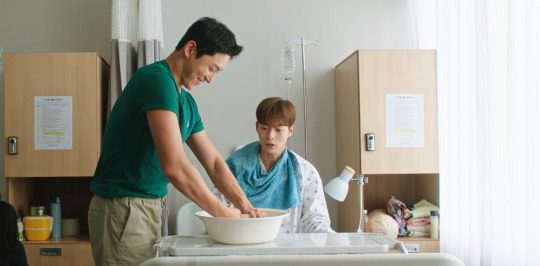
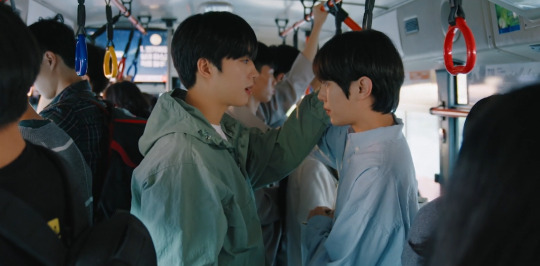
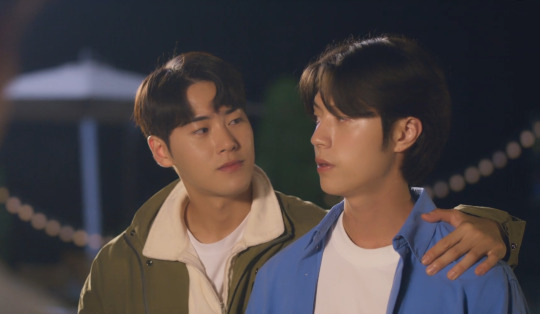
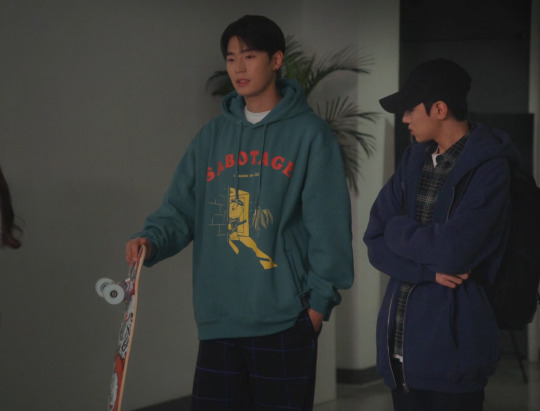
And Japan has shown that the Green Guy is the one who has the feelings first.
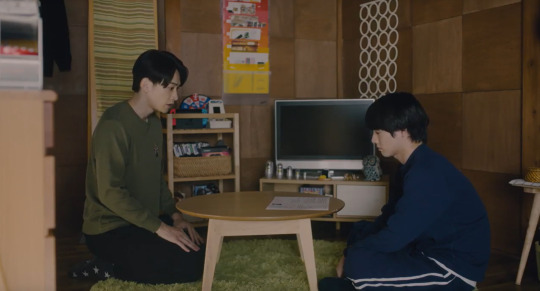
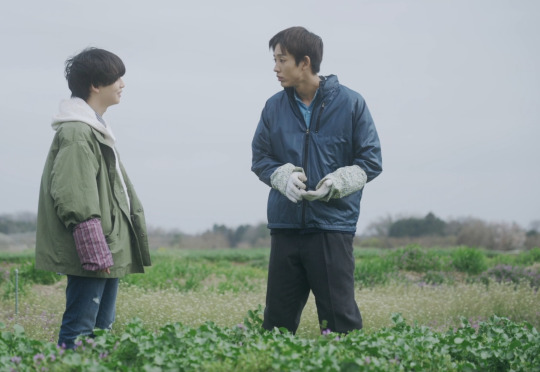
So it's very interesting that Thailand has framed the Blue Boy as already knowing his feelings while the Green Guy has to catch up, and the Blue Boy is being very Blue Boy about it (quiet, reserved, serious).
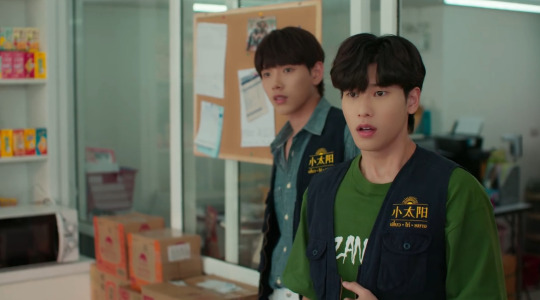
BUT, and this is a big BUT (Sir Mix-a-Lot "I like big butts" style), Thailand is doing something funky with the colors, and I like it.

Phumjai likes Tammy. Tammy's favorite color is blue; therefore, Phumjai, a Green Guy, wears blue, a lot.
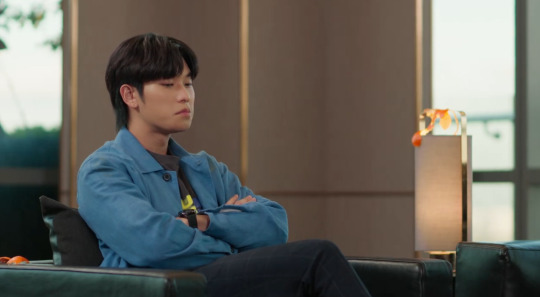
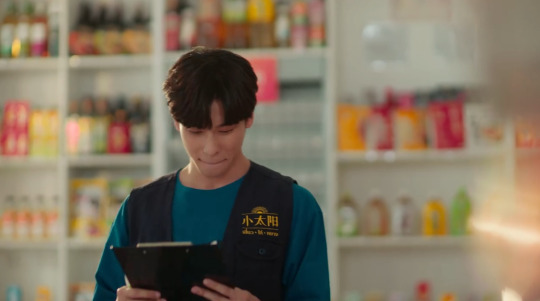
Yan Feng likes Phumjai. Phumjai's favorite color is green; therefore, Yan Feng, a Blue Boy, wears green, a lot.
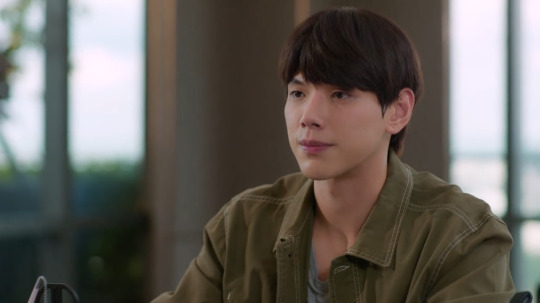

But the thing is, they both wore these colors before knowing what their love interest's favorite color was, so why would I believe Phumjai, who wears blue often, is the Green Guy, and Yan Feng, who wears green regularly, is the Blue Boy? Well, TAMMY!
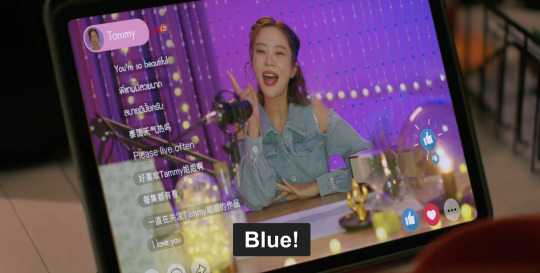
Tammy didn't wear green until she realized she liked Phumjai. She is a Blue Beauty, so her wearing green shows that she likes a Green Guy = Phumjai.

Also, when they were trying to figure out names for the store, Thai (Phumjai) was green, and Chinese (Yan Feng) was blue.
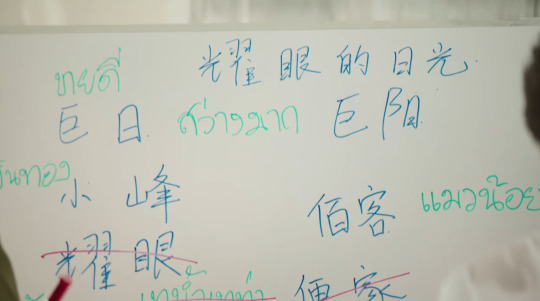
So unlike Japan and Korea who clearly code the characters as their respective colors and keep them that way until the exchange, Thailand's Atime26 seems to be implying that this relationship was destined to be which is why they are already wearing the other's color >insert Weaver Girl & Cowheader<
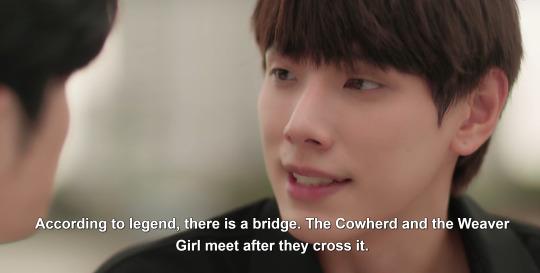
This year has been the year of this damn Weaver Girl x Cowheader: Never Let Me Go, Chains of Heart, and now this. All these shows include Chinese culture within them, but the first two dealt with fated lovers, so why wouldn't Love in Translation? Palm and Nueng went back in time to realize they were always meant to be. Not even death (which was faked) could separate Ken and Din. And now we have these two who even before they really got to know each other, they liked each other:
Outside of the dressing room, Phumjai threw his green shorts over the dressing room barrier at Yan Feng.

Yan Feng threw them back over

And Phumjai, who was trying on a blue shirt, said "thank you"

Which sparked a delightful conversation that made each one more confident and happy, but also, sealed their fate.
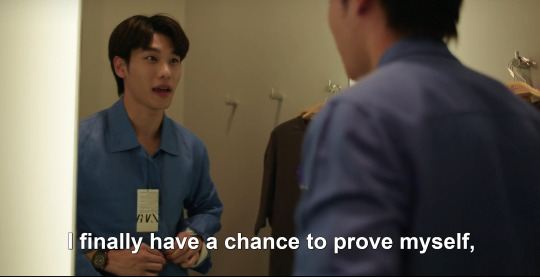
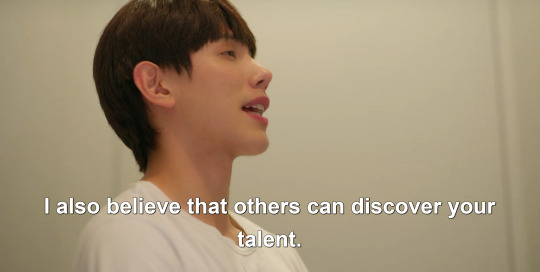
Because without knowing it,

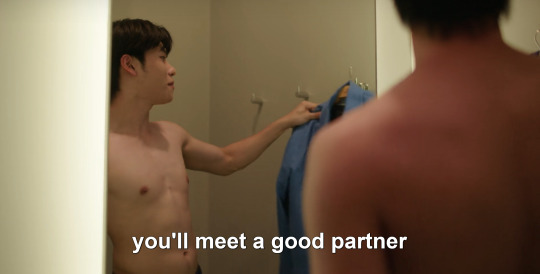
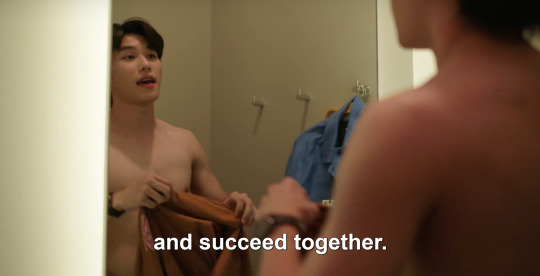
They were telling the other that the perfect person they were looking for was them.
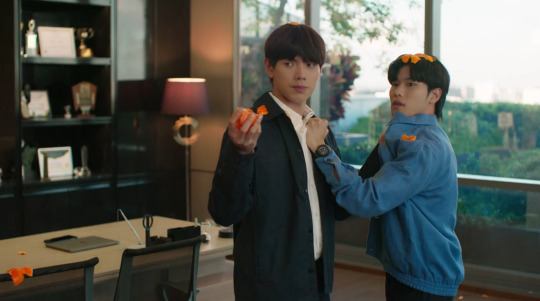
They were meant to find each other. They said it themselves.
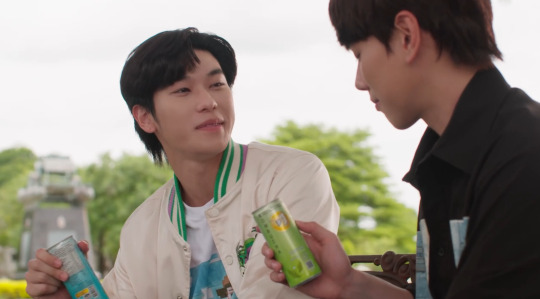
The product placement colors reinforce that.
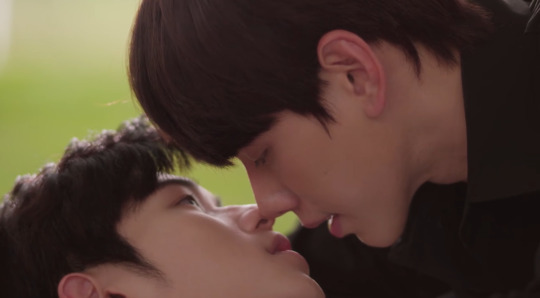

#Love in Translation#color coded boys in love#the colors mean things#and they mean this was destiny#the color exchange started before they even knew each other#Thailand has finally entered the Green Guy fight!#thanks for the ask!
62 notes
·
View notes
Text
Conspiracy theory
For those who claim the allegations are not a conspiracy theory against yan dev. Then let's talk about these questions.
Why was Yandere Dev's twitch and discord account suddenly banned without notice during and after the allegations? (Important note that people were using screenshots of yan dev's discord messages as the allegations)

Why is no one speaking out about the medibang and hacking incident where the yan sim fan base was spammed and shown with gore and porn images twice? All while painting that situation as "constructive criticism"? All while laughing about this? This is currently the fourth year and no youtubers made a single video about it
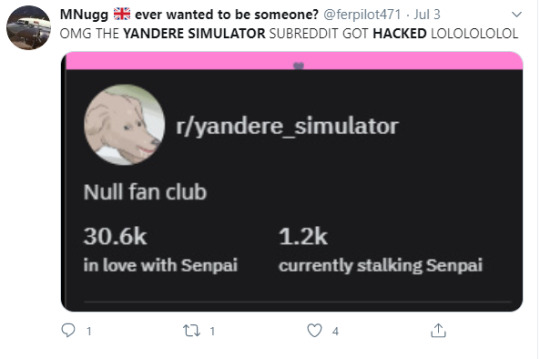






Note: The images of these posts contains of a man eating feces, and others showing a person's head decapitated and many more.
Why is a former mod of yan sim, Cleveland who is friends with a person with mental illness like DID, is perfectly okay with an admin who is a member of website and has records of mocking schizos with slurs? Why is cleveland putting a friend's illness problem on Yan dev rather than having this problem between Cleveland and the friend? Does the friend of Cleveland even know about that admin's records of mocking mental illnesses and suicide with the admin's friends? Especially an admin who is a member of website notorious for mocking mental illnesses in quote "autistic faggot incels?"


Why is there no mention of a first-degree murder attempt on yan dev by Mamofsirs? Why are these same people attacking yan dev trying to find or create more victims after this and why does the plan look familiar?



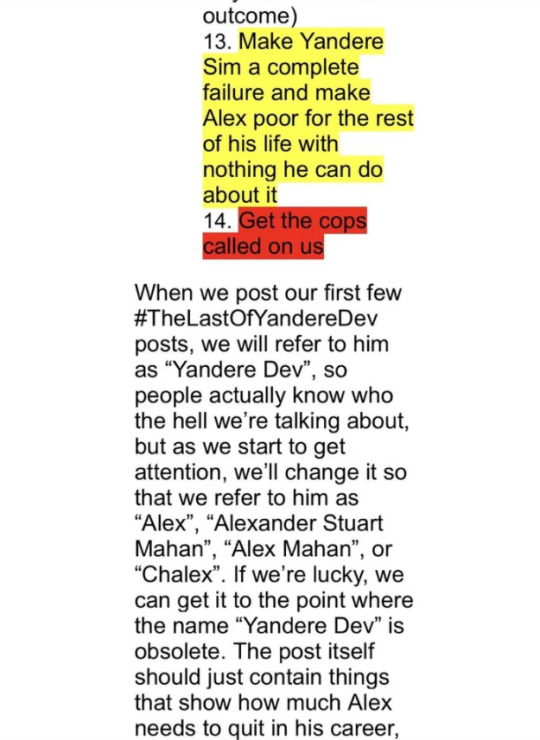
Why are the members of that subreddit have mass associations with a website notoriously known to dox and telling minors to commit suicide? The admin, a frequent member of the site, with his own words, saying "killing yourself is a joke"? Why do drama youtubers like someordinarygamers condone with that notorious website, claiming the website being purged as "censorship?"




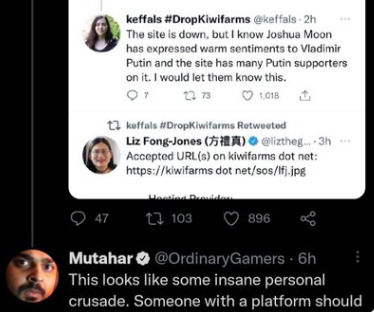
(someordinarygamers is blaming the person who is doxxed and harrassed by the notorious website, saying in summary, "watch what you fucking post about the kiwi farms you dumbass bitch")
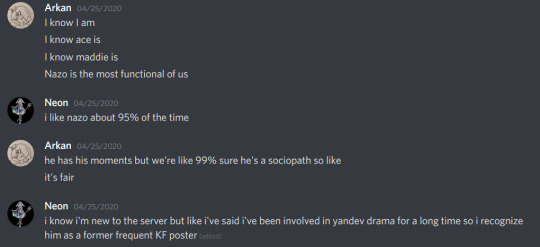
(The admin being a "former" frequent KF(kiwi farm) poster. The admin is not a former. The admin is still a member of kf to this day, and is known by close friends and mods for years)
All the drama youtubers who "addressed" the yan dev allegations have NEVER shown these images of the supposed victim(jelly/anne) being harrassed and silenced by the people attacking yan dev. Why did they refused to show those images in their videos?



7 notes
·
View notes
Text
Yan sim rewrite !!
♡
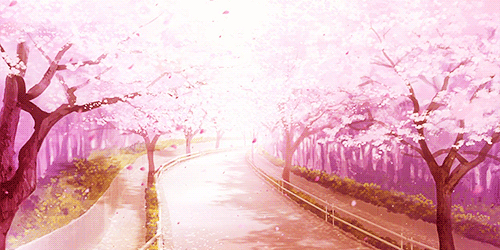
Part 1: Ayano Aishi
Or…Haruka Aishi!
Design compared to original:

Name meaning: Her name is now changed to Haruka to fit her character more! It means eternity and permanence. Like she was to be with Senpai/Taro for all eternity and keep him in her arms and permanence like she would keep these rivals out of Senpai’s reach permanently. According to her Kanji in her name (晴香) it can also mean spring which is the season the game is set in.
Character description:
For as long as she could remember she always felt different. And don’t take that lightly. Haruka was scary in the young children’s eyes, was it perhaps the way she looked at them? Was it the way she spoke? Or was it the way she acted. While she didn’t care too much about this her father was severely worried about that…for whatever reason. Her father was very protective and always made sure to tell her how to act around others. Soon enough to fix her attitude she became a sweet and innocent girl in the eyes of others. It’s only in high school when she met a boy did she start to care how she ACTUALLY appeared. She was in love and there was no denying it, his charming and mysterious personality just made her fall head over heels! But when she realised there would be obstacles in the way, she knew she would have to deal with them accordingly. But in each one that comes along, her cutesy exterior cracks more and more with each girl she eliminates.
My reasons:
For this we call her Ayano since this is Yandere Dev’s ‘character’.
In Ayano’s video on how she talks about her childhood, Ayano monologues about her life, explaining that she has always felt "hollow" and "empty" which is already a bad take for her character. It shows that Yandere Dev didn’t know what to do with her personality, and she suddenly gets emotions over a boy? I could consider it okay if she had Alexithymia, the trouble of expressing or feeling emotions but Yandere Dev was just going for an anime trope and not an actual character which is really irritating.
For my rewrite I decided to make her psychopathic(it’s genetic you’ll see when I talk about her parents) but due to her fathers worry she’d hide this with a cute and innocent facade. This will be very useful for gameplay and the story as it gives you an advantage, to be popular and praised instead of joining clubs. While you can still join them and still have those things to help you with certain tasks it shouldn’t be what makes Ayano popular. Also yes she does talk to Senpai and she doesn’t creepily follow him around, she wants to actually have a chance with him after all.
So…if Info Chan important for Ayano?
No. She isn’t. She isn’t even in this rewrite cause personally I think she ruins the games whole thing, trying to win Senpai on your own. Callimara explains this well but I’ll explain it as well.
Removing her from the rewrite will make the player and Ayano less like a puppet. If the player actually explores the school on their own they could figure it out by themselves without going through a whole gaming tutorial. I like the actual tutorial in the canon game with the drama play the Drama club are doing with a murder plan. But the rest needs to be purely up to the player. I think it would be more enjoyable and interesting that way. Of course you’d still have obstacles when Ayano is so popular but that’s a challenge the player would have to deal with and navigate in the game.
9 notes
·
View notes
Note
List 5 facts about a favorite sim of yours, and send this to 10 simblrs whose sims you adore ♥♥♥
Ty for sending, I adore your sims too. ; v ; <333
I'll do Macey this time.

She ran away at ten, when her dad tried to skip town, and since her relationship with her mom wasn't all that great, she ended up stowing away in his truck while he wasn't looking.
Thanks to her dad, a merc, she might know a little too much about knives and guns, and how to make explosives... ಠ_ಠ
She'd probably willingly die for you, if you can get past her shitty attitude.
She smokes a pack a day, but she's trying to quit.
She's constantly getting between Yan and Marco, but only bc she thinks they're both so fucking hot, and so fucking annoying, and she loves drama.
15 notes
·
View notes
Text
💕About me 💕

intro: glitter, 27, pan, she/her
more: pisces sun, libra moon, leo rising, infj, student, brainrot with genshin, phonk, cute stuff
genshin ar: 58 main: beidou
💜 Likes
sports: ice skating, swimming, winter sports in general
languages: fluent in german, english and turkish, i do understand spanish too but can't really speak it
games: genshin impact, overwatch, valorant, sims 4, vampire survivours, apex legends, dead by daylight, warhammer, started recently to like more "chill" games than FPS games, sun haven, palia, stardew valley, LOL
more: sex, getting spoiled, skincare, singing, writing, listening to music, glitter, aesthetic fashion, landscapes, poems, kawaii stuff
💔 Dislikes
drama: literally not into it
fandoms: they are special on their own, i just don't want beef
more: bullying, too loud noises, ignorance, mean people, just try to be respectful and i am all yours <3
byi/dni: link (important)
💜 Faves
genshin: thoma, scaramouche (but also wanderer), ayato, itto, zhongli, tartaglia, venti, diluc, kaeya, rosaria, kazuha, albedo, beidou (she can break me anytime), heizou, tighnari, cyno, kaveh, kokomi, gorou, hu-tao, shenhe
disylite: Ahmed (my love), Alice, Lucas, Hyde, Tang Xuan, Li Ling, Gaius (OP af i love him so much for this), Narmer, Ollie, Yun Chuan, Triki, Abigail, Intisar, Ethan (my femboy), Embla, Yamato, Eira, Falken, Arcana, Sanders, Alexa (fun fact it is my pfp here KEK), Heng Yue, Luo Yan, Chloe, Jacob, Long Mian, Stewart, Xiao Yin, Parmi (my love), Fabrice, Ye Suhua
6 notes
·
View notes
Note
I think fixing art is ultimately pretty narrow sighted and most of the time has some kind of ulterior motive, because at the end of the day, those artists are forcibly bending the art to their own liking. it's like grabbing the other person's pen and scribbling over their art even though youre a complete stranger at best. The thing about criticism is youre supposed to help the other person on how to make/improve their art, not about how you personally want it to be.
this is how I feel too. Especially when I saw those "Fixing yandere simulator art!!!" images. (Not getting into yan sim drama, fuck the dev,the characters are MINE now and kissing the ocs I made for it forever ago)
but those just boiled down to "BOOBY BAD!!!!!!!!!!" "CURVY WOMAN BAD!!!!!!" and it's wewirrdddd
1 note
·
View note
Note
Oh shoot, Im sorry about that, can i request Sakaya Mizono icons instead w the same request, i forgot about the whole yan sim drama ;-; so sorry
No worries Softie!! And yeah this one is totally alright with me ^^ you'll be able to find your request right {here!} Just let me know if you need me to change anything as always <33

1 note
·
View note
Text
yandere sim redesign ideas???
i’ve been thinking (uh oh-) about making one of those Yandere Simulator Redesigns videos on my yt, but my ideas just turned the main rival Osana and her guar dog Ribaru into an angst filled one-sided pining and- i’m diggin it??? i think it’s kinda cool, idk.
#i mean#i fuckin hate YanDeb but the ideas the game is giving me are kinda cool-#like-#bro i just turned Osana pan#also the second rival? boom. Ace.#the idea is that MC (Ayano) finds literally anyone with girl parts as a threat#even the ones that aren't interested on Taro (Love Interest)#and that includes the gay ones too lmao-#Drama kid rival just screams Bi Queen#haha end me#yan sim redesign#MC is a toxic bitch tho#toxic teen simulator#literally
2 notes
·
View notes
Text
I’m not one to get into drama, so this is all I’m gonna say.
If you don’t want “gremlins” all over you anymore, actually address the shit you’ve done in the past. It doesn’t excuse you automatically, but saying “Hey! that shit I did in the past was really bad of me and I’m not proud of it and I’m sorry” may get you a lil bit further than blaming everyone for what’s happening to you; because in the end you’re just proving them right.
because addressing things nicely and talking to your followers like they’re actual people will get you a whole lot further than playing the blame game
88 notes
·
View notes
Text
Ep. 01: Cells
The trainees are split up in small groups. These are called "cells". Each cell consists of three trainees. When a cell does not have enough votes, all three trainees in that cell will be eliminated.
However, trainees can change their cells. Those who rank in the TOP9, get to pick their cell first.
In episode 01, each cell consists of a Korean, a Japanese and a Chinese trainee. The first cells were put together based on their "connections" (something they have in common).
NOTE: Not every cell had that much screen time so not all connections will be included. Same goes for the trainees: not all of them were shown a lot so some cells might be based on speculation.
Cell 1: "Role Models"
- Kim Ye Eun
- Kawaguchi Yurina
- Gu Yizhou
Cell 2: "Athleticism"
- Lee Yun Ji
- Murakami Yume
- Liu Shiqi
Cell 3: "Acting Girls"
- Lee Chaeyun
- Ikema Ruan
- Lin Chenhan
Cell 4: "Youngest"
- Guinn Myah
- Kuwahara Ayana
- Liu Yuhan
Cell 5: "Crayon Shin-Chan"
- Kim Chaehyun
- Kanno Miyu
- Huang Xingqiao
Cell 6: "Invertebrate Girls"
- Kang Yeseo
- Kamikura Rei
- Chiayi
Cell 7: "Almost debuted together"
- Lee Yeon Gyung
- Sakamoto Mashiro
- Cui Wenmeixiu
Cell 8: "Game Lovers"
- An Jeongmin
- Shima Moka
- Ma Yuling
Cell 9: "Jin Goo Oppa"
- Choi Yeyoung
- Ito Miyu
- Wen Zhe
Cell 10: "Good dancer"
- Sim Seungeun
- Ando Rinka
- Chien Tzuling
Cell 11: "Main Vocalist"
- Kim Hyerim
- Kubo Reina
- Xia Yan
Cell 12: "Number One Vocalist"
- Jeong Jiyoon
- Nakamura Kyara
- Wang Yale
Cell 13: "All-rounder"
- Kim Suyeon
- Nonaka Shana
- Fu Yaning
Cell 14: "Girls who love chicken feet"
- Huh Jiwon
- Sakurai Miu
- Cai Bing
Cell 15: "Mint chocolate lovers"
- Yoon Jia
- Oki Fuka
- Li Yiman
Cell 16: "I have an album on my own"
- Choi Yujin
- Okazaki Momoko
- Xu Ziyin
Cell 17: "Girls Generation"
- Kim Bora
- Hayase Hana
- Zhang Luofei
Cell 19: "Pretty Girls"
- Kim Doah
- Okuma Sumomo
- Chen Hsinwei
Cell 20: "Top Ones"
- Kim Dayeon
- Ezaki Hikaru
- Shen Xiaoting
Cell 21: "Survival Once Again"
- You Dayeon
- Kishida Ririka
- Su Ruiqi
Cell 22: "26 Years of Experience in Dancing"
- Lee Sunwoo
- Hiyajo Nagomi
- Poon Wingchi
Cell 23: "Talkative ENFP"
- Lee Hyewon
- Kamimoto Kotone
- Liang Jiao
Cell 24: "Crybaby"
- Joung Min
- Hayashi Fuko
- Liang Qiao
Cell 25: "New Trainee"
- Huening Bahiyyih
- Sakamoto Shihona
- Hsu Nientzu
Cell 26: "Girl who gnaws ribs"
- Cho Haeun
- Arai Risako
- Xu Ruowei
Cell 27: "Cat Butler"
- Ryu Sion
- Terasaki Hina
- Chang Ching
Cell 28: "Language Masters"
- Lee Rayeon
- Yamauchi Moana
- Wu Tammy
Cell 29: "03s"
- Han Dana
- Aratake Rinka
- Wang Qiuru
Cell 30: "Ballerinas"
- Seo Youngeun
- Inaba Vivienne
- Ho Szeching
Cell 31: "K-POP self-educated"
- Kim Sein
- Nagai Manami
- Leung Cheukying
Cell 32: "K-Drama fan"
- Kim Yubin
- Kitajima Yuna
- Yang Zige
Cell 33: "Giant Girls"
- Suh Jimin
- May
- Zhou Xinyu
68 notes
·
View notes
Note
Wait a second, wait a damn second... I have some questions. Is the layout of Akademi in the choose your own adventure game the same as regular modern Akademi from Yan sim? Because if so, this opens up so many more possibilities for us. Ex. Potential escapes, knowledge of who could be where, using knowledge from the last thing I said to find help (run to soft protective yan when
sadistic yan confronts or punishes us), knowledge of items in rooms for use of defense, knowing whether or not being late to a character event is a possibility (ex. Diluc wants to meet you in 2 min in the cooking room, you're on the roof, run or your late and envy goes up), knowing whether or not certain characters could be in danger, where and whether or not you could be in time to save them if you want to.
Also, are we basically the same a yan sim senpai? No special talents, pretty average, but has people simping hard? If so, then the whole character we have is like an empty slate of otome protag.
Going with my last question, assuming the character we use to choose things is a blank slate, would we be able to build certain characteristics into them by choosing similar choices or choices related to certain personalities? Example, we being idiots decide that flirting with almost all the yans every time we can would be a good idea and that unlocks more flirty choices (seduction, sweet talking and the like)
Lastly, would we be able to learn new things by being in different rooms or by being with different people? Example, you stay in the drama room with Kaeya, he gives you some acting tips and now you can easily manipulate the less cunning yans.
Depending on what you answer, any of these could be complete game changers, we could use these to escape plenty of almost death situations and decide whether or not running would even be an option (ex. We have low endurance so engaging in a three floor chase with a man is stupid, but if we can sprint, sprinting to a room close to us could be very good.)
Also I'm so sorry for the wall of text lol.
Your fine! Also great questions btw but unfortunately as to not reveal all the eggs in the basket I’ll keep my answers kinda vague
1. Yes/no senpai isn’t just your average student she has passive and active skills.
However they are currently locked and in order to use them effectively for the upcoming challenges ahead, you’ll have to stumble upon some opportunities to awaken her skillset
2. There’s already special characteristics that Senpai has however depending on the choices you make…Yes you can build up certain persona that’ll aide you in obtaining useful attributes
3. Yes, but you can only join up to three clubs and in order to learn new skills you have to increase the affection lvl of the club leaders up to 80%
#yandere simulator au#yandere simulator#choose your adventure#guidelines#otome! genshin impact#otome! yandere genshin impact#otome! yandere genshin#otome game#thanks for submitting <3#game highlights#senpai
22 notes
·
View notes
Note
Hi hello, I am a very indecisive person and am in a bit of a dilemma, could you please help me out? Okay so I started a random gameplay for funsies and got invested unsurprisingly. Okay so my sim has dated several Npcs including cassandra goth (young adult), lilith vatore and megumi ito (I hate her husband) Okay so my sim is currently engaged to megumi ito and they have a baby girl named momo (she's the cutest). The thing is whenever my sim meets either cassandra or lilith, they always autonomously flirt with either of them and then argue in that same sequence , my mind decided to go the route of they still have a lot of bad feelings about the breakup but they still care and such. Should I make my sim a cheating scumbag? Or should I turn this into a sort of soap opera where he leaves megumi at the altar for one of the ladies? Please I want to know your thoughts on all this.
That is quite the dilemma. 😆
Yeah, my sims do this too, tbh, idk sims in The Sims 4 are very flirty, and as long as they’re in a good mood they’ll likely react to it positively, unless you’ve got mods installed.
I’m constantly having to keep an eye on Yan when I’m playing her around other sims, bc they all wanna flirt with her, and she’s weirdly accepting of it, even though she and Marco are True Lovers, and have kids together, and clearly enjoy being together.
I’d say do it, if to just see what might come of it. Perhaps use “save as” to create a separate save in case it doesn’t turn out to your liking, bc idk, Marco catches her doing it sometimes, and I’ll be like “oh cool, drama,” expecting him to get defensive ( like he does in TS3 ), but he just gets sad for a few hours, despite being a jealous sim, and forgets it even happened entirely? So I personally just don’t find there’s much of a payoff, or even a consequence to it enough to think much of cheating in The Sims 4, gameplay wise.
0 notes
Link
In late July, sitting in my sister-in-law’s home in St. Louis, Missouri, I waited in the “lobby” area of Cloud Theatre for Zoom Parah to begin. Itself a creation born of the pandemic, Cloud Theatre is an online platform which strives to offer a seamless digital theatre experience to global audiences. Their “lobby” is a simple but smart artificial space: a live chat box, available to attendees as they login for a show, is positioned next to the image of a theatre stage, framed by red curtains. The waiting room attempts to replicate the experience of audience members mingling and chatting before a performance begins. Joining others in this virtual space, I was excited to see another Malaysian, also based in the United States, mention that they were from Petaling Jaya—my hometown. I excitedly typed back, “I’m from PJ, too!” The spark of recognition flashing across the chat box was akin to overhearing a conversation between strangers, and interjecting to share a mutual connection. Months into social distancing protocols, the Cloud Theatre lobby reminded me that there was something inherently sociable about joining hundreds of people from around the world to watch this production together—albeit, online.
“We had people who’d never seen theatre before experience it for the first time using Zoom.” Malaysian theatre director, actor and writer Jo Kukathas stressed this point repeatedly when discussing Zoom Parah, the online adaptation of the critically acclaimed play, Parah. This digital theatre performance, and the new viewing experiences it made possible, is just one of many examples of innovative work being produced by Southeast Asian directors, producers, and actors since the pandemic. In the early days and weeks of Covid-19, theatre makers from this region—like so many others around the world—watched in despair as stages went dark and theatres shut their doors. Despite the dire conditions, they rallied—with little to no funding and even less governmental support—to reimagine theatre in the time of COVID. They created innovative forms of theatre designed for Zoom, streamed recordings of award-winning plays that had not previously been available online, and held numerous talk-back sessions to reflect on the creative process. The digital turn in Southeast Asian theatre has provided unprecedented access to experimental and critically acclaimed work from the region. These productions have connected audiences and diasporic communities around the world, focusing often on urgent questions of race, identity, and belonging. These developments offer models not only for the professional theatre world, but also for teachers and students of the performing arts who are navigating online education.
In their articles for Offstage and The Business Times, Akanksha Raja and Helmi Yusof discuss half a dozen new Singaporean and Southeast Asian theatre projects which have embraced the digital turn. These include: Murder at Mandai Camp and The Future Stage from Sight Lines Entertainment; Long Distance Affair from Juggerknot Theatre and PopUP Theatrics; Fat Kids Are Harder to Kidnap from How Drama; and Who’s There? from The Transit Ensemble and New Ohio Theatre. While these are just a few of the productions that have emerged since the pandemic began, they are impressive in scale, quantity, and range of forms. These performances have taken advantage of every feature offered by Zoom, YouTube, Instagram, Facebook, WhatsApp and other social media platforms. They’ve incorporated chat boxes, polls, and even collaborative detective work on the part of the audience. In addition to Zoom Parah (by Instant Café Theatre), I’ve had the opportunity to watch Who’s There?, as well as a recording of WILD RICE theatre’s celebrated play, Merdeka, written by Singaporean playwrights Alfian Sa’at and Neo Hai Bin. Of these three, Zoom Parah and Who’s There? illuminate the technological and socio-political interventions of Southeast Asian digital theatre, as well as the ways in which COVID-19 has redefined performance and spectatorship.
In addition to the virtual lobby and chat function, Zoom Parah employed live English translation in a separate text box, making the production accessible to those not fluent in Malay. Who’s There? like Zoom Parah, also made the most of the chat function, along with approximately a dozen polls which punctuated the performance. Each poll gauged audience reactions to the complex issues the play addressed and reflected the responses back to the viewers. This feature required audience members to pause, reflect on a particular scene and its context, and assess the perspectives through which they were viewing the performance. In effect, the polls created a dynamic feedback loop between the cast, crew, and viewers, offering an alternative to the in-person audience response that is so crucial to live performances. Augmenting their efforts to keep audience members plugged in, the play experimented with layering lighting, sound, and mixed media to produce different visual and sound effects within the Zoom frame.
Alongside their adaptation of online technologies, both plays are also noteworthy for their socio-political interventions. Parah, the critically acclaimed play on which Zoom Parah is based, was written in 2011 by award-winning Singaporean writer and resident playwright at WILD RICE theatre, Alfian Sa’at. It follow a group of 11th grade students of different races (Malay, Chinese, and Indian) as they navigate reading the controversial Malaysian novel, Interlok, which sparked national debates surrounding racial stereotypes. The classmates, who share a deep friendship, challenge each other’s views of the novel by reflecting on their lived experiences. Zoom Parah retained the original plot and script, bringing the play’s pressing questions into a national landscape marked by pandemic lockdowns and political upheaval, and shadowed by new iterations of Malay supremacy. At a volatile time for the country, Zoom Parah questions what it means to be Malaysian, making visible the forms of belonging and exclusion that continue to shape national identities.
Who’s There? was also invested in broaching difficult discussions of contemporary issues. A transnational collaboration between artists from the US, Singapore, and Malaysia, the play was part of the New Ohio Theatre’s summer festival, which moved online due to the pandemic. Who’s There? aimed to tackle some of the most contentious racial topics of 2020: the killing of George Floyd and the ensuing Black Lives Matter protests; the use of black and brownface in Malaysia; and the relationship between DNA testing and cultural identity. The production was structured as a series of linked vignettes, featuring different sets of characters wrestling with interconnected racial and national contexts.
Both Parah and Who’s There speak to the arts’ inherent capacity to not merely experiment with form and aesthetics in the digital realm, but to also engage the complexity of history, politics, and contemporary culture. As Kukathas recently reflected, “The act of making theatre to me is always about trying to connect to the society that I live in; that could be local, that could be global . . . people want to hear stories, and to connect through stories.” By taking on the dual challenge of experimenting with digital technologies and responding to what’s happening in the public square, Southeast Asian digital theatre joins work such as the Public Theatre’s all-Black production of Much Ado About Nothing to offer new frames through which to view race, rights, and identity—even and especially in the midst of a global pandemic.
Kukathas’ comments on the inherently social motivations of her work were shared during a Facebook Live discussion entitled “Who’s Afraid of Digital Theater?”. The conversation aired on 20 August, hosted by WILD RICE theatre and moderated by Alfian. Focusing on “the possibilities and pitfalls of digital theatre,” the discussion featured reflections from artists who have helped launch this new era of Southeast Asian theatre. The panelists included Kukathas, Kwin Bhichitkul from Thailand (director, In Own Space) and Sim Yan Ying “YY” from Singapore (co-director and actor, Who’s There?). Approximately 100 people tuned in for the discussion, and the recording has accrued over 8,000 views on Facebook. During the conversation, the theatre makers shared rationales for their creative choices, as well as strategies for navigating the challenges of developing online performances. Their insights offer potential pathways for other theatre professionals, as well as teachers and students of theatre who are continuing to work online.
Bhichitkul, Kukathas, and Sim’s approaches to digital theatre diverged significantly from one another. They each played with different technologies and were guided by distinct motivations. Bhichitkul was focussed on the isolation created by the pandemic and, responding to this fragmentation, he asked 15 artists to create short, 2-minute video performances. Bhichitkul explained that this project also had an improvisational twist: “Every artist need[ed] to be inspired by the message of the [artist’s] video before them. They couldn’t think beforehand, they needed to wait until the day [they received the video]” before creating their own. The creative process was thus limited to just a 24-hour window for each artist. The entire project spanned 15 days, with Bhichitkul stitching the videos together on the final day.
On the other hand, Kukathas felt strongly that her foray into digital theatre required a deep connection to a live, staged performance. Therefore, she chose Parah—a play she directed for six re-stagings between 2011-2013—as the production she would adapt to Zoom. Kukathas explained, “If I was going to start experimenting with doing digital theatre . . . it needed to be a play that I was very familiar with, and a play that the actors were very familiar with. I wanted the actors to really inhabit their bodies, so that the energy of the actor’s body was very present even through the screen . . . I [needed] actors who have a kinetic memory in their body of that performance being 360 degrees.” Unlike Kukathas, Sim was “interested in doing something as far away from live theatre as possible” and did not want to be “beholden” to its conventions. She views digital theatre as “a new art form in itself; not an extension of live theatre, not a replacement, but something that straddles the line between theatre and film.”
The directors’ reflections on their respective productions illustrate the range of forms, techniques, and points of view with which theatre makers are experimenting. They also suggest that digital theatre has the potential to accommodate a surprisingly wide variety of directorial visions and investments.
And while their approaches might vary, these theatre makers all agreed about the benefits and opportunities of digital theatre. They returned repeatedly to the advantages of greater accessibility and transnational reach without the costs of international travel. Kukathas and Sim cited accessibility and the pay-what-you-can model as being particular priorities for them. Kukathas was especially proud of the fact that “we could reach the play to people who would ordinarily not be able to go to the theatre. And we made our tickets really cheap: our cheapest ticket was RM5 (US $1). We did that deliberately so that people who don’t usually even go to the theatre would get a chance to watch it. So we had people who’d never seen theatre before experience it for the first time using Zoom.”
The directors also view the digital turn as one which opens up new avenues for creativity and collaboration. Sim recalls, “We still spent 3-4 hours per rehearsal, 4 times a week, on this space together. We developed a closeness and a relationship with each other even though we never met live. And we still shared a lot of cross-cultural exchanges.” Kukathas views the shift to online technologies and platforms as one which prompts us to ask big questions about theatre and to re-evaluate the rules of spectatorship. Filming theatre at home, sharing it online, and watching it at home creates, according to Kukathas, a merging of “strangeness and ordinariness” that shrinks the spaces between public and private. The ensuing disorientation poses, for Kukathas, a number of pivotal questions: “What is theatre? What are the impulses that drive us to make a piece of theatre? What is it to watch theatre? How free are you now when you’re watching? . . . I think this could be a good chance to question why we have certain rules [in theatre] and whether those rules are really necessary.”
While we are used to hearing laments about the digital as the enemy of “the real,” the digital turn in Southeast Asian theatre suggests an opening and an expansion; a chance to reimagine the performing arts, develop new forms of collaboration, and reach wider and more diverse audiences. As Akanksha Raja notes in Offstage, “performance-makers have been recognising that the way they choose to embrace technology can not only enhance but possibly birth new forms of theatre.”
However, it’s crucial not to romanticise the very real challenges of alternative forms and platforms. Alfian noted that, “In a traditional theatre, you are a captive audience . . . you’re not allowed to be distracted, not allowed to look at your phone. On the one hand, we’re seeing there’s the freedom to not be so disciplined when watching a show. But at the same time, is the freedom necessarily a good thing? You’re actually quite distracted and you’re not giving your 100 percent [attention] to the work.”
Sim and Kukathas agreed to an extent, but pointed out alternative advantages: group chats and texts in a “watch party” format build a sense of connection among audience members and provide real-time audience reactions and feedback. Kukathas recalled how attendees used the chat box (along with text messages and DMs) to alert Kukathas and her producer to a sound issue that they were not aware of. Kukathas laughingly reflected, “I really appreciated how invested people were. They were like, ‘Fix this right now!’ and then we had to rush to try to fix it. It made me feel how alive we were—the audience was shouting at us!”
The digital turn in Southeast Asian theatre is bringing a wide range of productions to global audiences. The literary and cultural traditions of this region are incredibly rich and have always been shaped by complex histories of migration, exchange, and adaptation. Digital theatre is borne of new practices of migration, exchange, and adaptation—and of necessity. While there have been controversial debates in countries like Singapore and Malaysia about the value of the arts during this pandemic, the creatives featured here are turning to the digital in order to keep art alive and to keep their companies and projects afloat. They are extending an invitation to audiences and to collaborators to embrace play and experimentation, to find opportunities in the challenges of online theatre, and to recognise that art is essential, now more than ever.
56 notes
·
View notes
